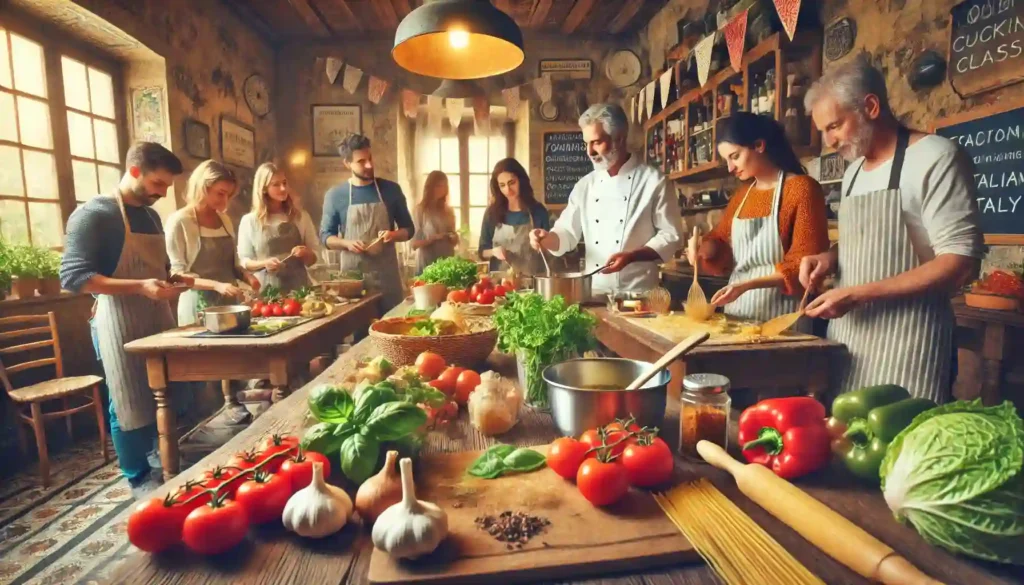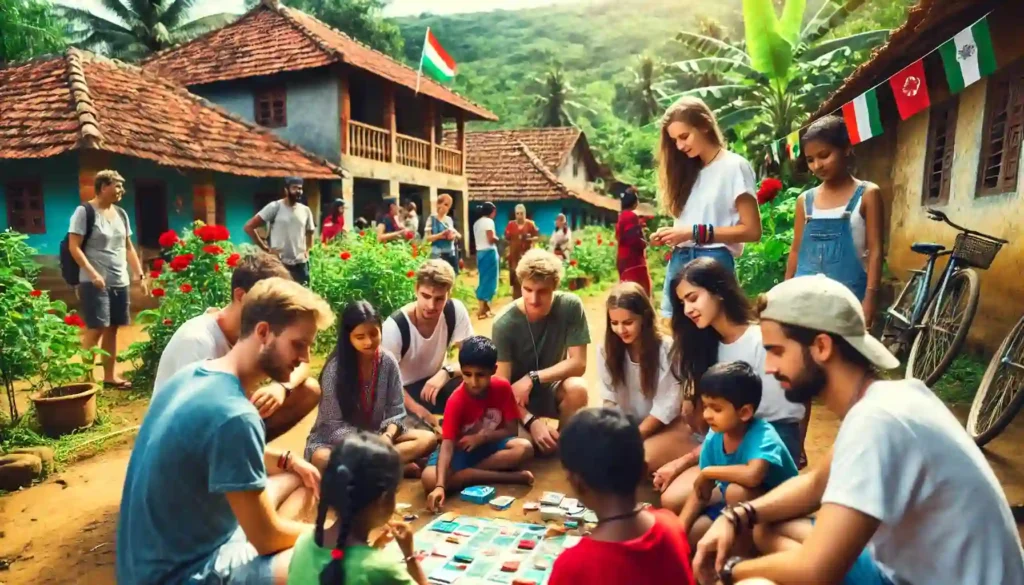Cultural immersion offers travelers the opportunity to experience destinations in a deeply meaningful and authentic way. By engaging with local customs, traditions, and people, travelers can gain a richer understanding of the places they visit. Cultural immersion goes beyond typical tourist activities, allowing for genuine connections and transformative experiences.
“To travel is to discover that everyone is wrong about other countries.” – Aldous Huxley, author and philosopher.
Aldous Huxley’s quote highlights the power of travel to challenge preconceived notions and foster understanding.
Understanding Cultural Immersion
Cultural immersion involves actively engaging with the culture of a destination. This can include participating in local customs, learning the language, staying with locals, and more. Cultural immersion aims to provide a deeper, more authentic travel experience that fosters mutual understanding and respect.
Key Aspects of Cultural Immersion
- Local Interaction: Engaging with locals to learn about their way of life.
- Traditional Activities: Participating in traditional customs and practices.
- Language Learning: Making an effort to learn and use the local language.
- Authentic Accommodation: Staying in local homes or small, locally-run accommodations.
“The real voyage of discovery consists not in seeking new landscapes, but in having new eyes.” – Marcel Proust, novelist.
Marcel Proust emphasizes the transformative power of truly seeing and understanding new cultures.

Benefits of Cultural Immersion
Engaging in cultural immersion offers numerous benefits that enhance the travel experience. Cultural immersion allows travelers to build meaningful connections, gain new perspectives, and create lasting memories.
Meaningful Connections
Forming genuine connections with locals can lead to lasting friendships and a deeper appreciation of the culture.
- Personal Stories: Hearing personal stories from locals provides insight into their lives and traditions.
- Shared Experiences: Participating in local activities fosters a sense of community and belonging.
- Mutual Respect: Building mutual respect and understanding through direct interaction.
Enhanced Understanding
Cultural immersion helps travelers gain a more nuanced and comprehensive understanding of a destination.
- Cultural Insights: Learning about cultural norms, values, and traditions.
- Historical Context: Gaining a deeper understanding of the historical background and its impact on the present.
- Different Perspectives: Seeing the world from different viewpoints and challenging personal biases.
Unique Experiences
Immersive travel experiences are often more unique and memorable than typical tourist activities.
- Traditional Events: Attending local festivals, ceremonies, and celebrations.
- Hands-On Activities: Participating in traditional crafts, cooking, or agricultural practices.
- Off-the-Beaten-Path: Exploring areas and activities not typically included in standard tourist itineraries.
“Travel is fatal to prejudice, bigotry, and narrow-mindedness.” – Mark Twain, author and humorist.
Mark Twain highlights how travel can open minds and promote tolerance and understanding.
How to Achieve Cultural Immersion
Achieving cultural immersion requires intentional effort and a willingness to step outside your comfort zone. Here are some tips for incorporating cultural immersion into your travels.
Stay with Locals
Opt for accommodations that allow for direct interaction with locals.
- Homestays: Stay with local families to experience daily life firsthand.
- Guesthouses: Choose small, locally-run guesthouses for a more personal experience.
- Community-Based Tourism: Participate in community-based tourism initiatives that benefit local communities.
Learn the Language
Making an effort to learn and use the local language can greatly enhance your travel experience.
- Language Classes: Take language classes before or during your trip.
- Language Apps: Use language learning apps to practice basic phrases.
- Practice with Locals: Practice speaking with locals, even if you make mistakes.
Participate in Local Activities
Engage in activities that are part of the local culture and way of life.
- Cooking Classes: Learn to cook traditional dishes with local chefs.
- Craft Workshops: Participate in workshops to learn traditional crafts and arts.
- Volunteer Work: Volunteer with local organizations to give back to the community.
Respect Local Customs
Show respect for local customs and traditions to build positive relationships with locals.
- Dress Appropriately: Follow local dress codes and customs.
- Etiquette: Learn about local etiquette, such as greetings and dining practices.
- Ask Questions: Show interest and curiosity by asking respectful questions about the culture.
“To truly experience a culture, you must be willing to immerse yourself in it.” – Rick Steves, travel writer and television host.
Rick Steves emphasizes the importance of fully engaging with a culture to experience it authentically.
Examples of Cultural Immersion
Different destinations offer unique opportunities for cultural immersion. Here are some examples of cultural immersion experiences around the world.
Japan: Tea Ceremony
Participate in a traditional Japanese tea ceremony to learn about the art and culture of tea.
- Cultural Significance: Understand the historical and cultural importance of the tea ceremony.
- Hands-On Experience: Learn the steps of the tea preparation and serving process.
- Mindfulness: Experience the meditative and mindful aspects of the tea ceremony.

Peru: Homestay on Lake Titicaca
Stay with a local family on the islands of Lake Titicaca to experience traditional Peruvian life.
- Daily Life: Participate in daily activities such as farming, cooking, and weaving.
- Cultural Exchange: Share meals and conversations with your host family.
- Traditional Festivals: Join in local festivals and celebrations if your visit coincides with these events.
India: Volunteer Work
Volunteer with a local organization in India to contribute to the community and learn about local issues.
- Community Projects: Work on projects related to education, health, or environmental conservation.
- Cultural Insights: Gain a deeper understanding of the challenges and successes of local communities.
- Personal Growth: Develop new skills and perspectives through hands-on volunteer work.

Italy: Cooking Classes
Take a cooking class in Italy to learn about traditional Italian cuisine and culinary techniques.
- Local Ingredients: Use fresh, locally sourced ingredients to prepare traditional dishes.
- Culinary Techniques: Learn techniques passed down through generations.
- Cultural Connection: Connect with local chefs and fellow food enthusiasts.
“Travel is the only thing you buy that makes you richer.” – Anonymous
This quote underscores the enriching and transformative power of travel.
The Future of Cultural Immersion
As travel trends evolve, cultural immersion is becoming increasingly popular among travelers seeking meaningful and authentic experiences. Cultural immersion will continue to play a vital role in how people explore and understand the world.
Sustainable Tourism
Cultural immersion aligns with the principles of sustainable tourism by promoting respect for local cultures and minimizing negative impacts.
- Responsible Travel: Encouraging travelers to make mindful and responsible choices.
- Community Benefits: Ensuring that tourism benefits local communities economically and socially.
- Environmental Awareness: Promoting eco-friendly practices and conservation efforts.
Technology and Accessibility
Advances in technology are making cultural immersion more accessible to a wider audience.
- Virtual Experiences: Offering virtual tours and experiences for those unable to travel physically.
- Language Translation: Utilizing real-time translation tools to facilitate communication.
- Online Learning: Providing online resources and courses to learn about different cultures before traveling.
Personalized Travel
Travel companies are increasingly offering personalized and immersive travel experiences.
- Customized Itineraries: Tailoring travel plans to include cultural immersion activities.
- Local Guides: Employing local guides who offer insider knowledge and authentic experiences.
- Niche Travel: Focusing on niche markets such as culinary tours, art retreats, and volunteer vacations.
“The future of travel lies in authentic and meaningful experiences that foster understanding and connection.” – Samantha Brown, travel host and author.
Samantha Brown envisions a future where travel is defined by authentic connections and cultural understanding.
Understanding Cultural Immersion offers insights into making travel more meaningful. For more tips on authentic travel experiences, visit Authentic Travel Tips. Discover additional strategies for immersive travel in our immersive travel section. Learn more about sustainable tourism with our guide to eco-friendly travel. For more information on cultural immersion, visit National Geographic Travel. To explore cultural travel opportunities, check out Intrepid Travel. For additional resources, see Lonely Planet.















